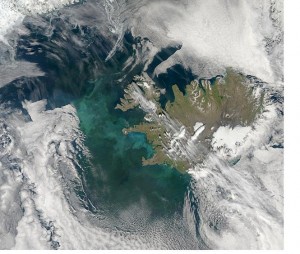TUESDAY, 26 JULY 2011
 As the Arctic warms and polar ice melts, a passage has opened that has allowed the algae to return from the Pacific. The migration of N. seminae comes in parallel to reports last year of a Pacific grey whale that was seen in the Atlantic Ocean, from where it vanished three centuries ago.
As the Arctic warms and polar ice melts, a passage has opened that has allowed the algae to return from the Pacific. The migration of N. seminae comes in parallel to reports last year of a Pacific grey whale that was seen in the Atlantic Ocean, from where it vanished three centuries ago.Rather than being good news, experts say that small changes to oceanic food webs could lead to ecosystem shifts with unpredictable effects. The North Sea has already seen a decline of the crustacean Calanus finmarchius, which is being replaced by varieties that are smaller and less nutritious. This is causing disruptions further up the food chain, affecting fish stocks, fish-eating birds and the harbour porpoise.
Dr Carlo Heip from the Royal Netherlands Institute for Sea Research believes that although some species may thrive, ‘most of the impacts are so clearly negative, and the scope of change so potentially huge that, taken together, they constitute brightly flashing warning signals.’ [1]
Written by Catherine Moir
